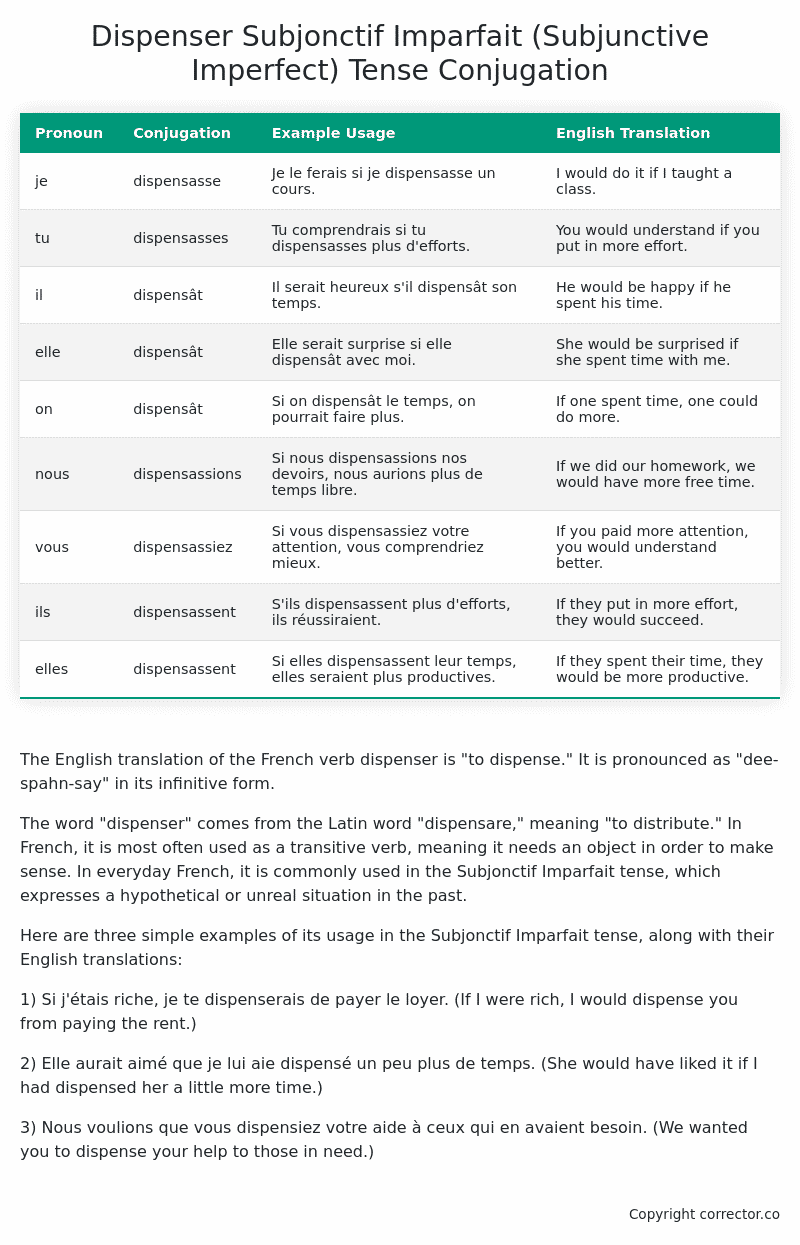Subjonctif Imparfait (Subjunctive Imperfect) Tense Conjugation of the French Verb dispenser
Introduction to the verb dispenser
The English translation of the French verb dispenser is “to dispense.” It is pronounced as “dee-spahn-say” in its infinitive form.
The word “dispenser” comes from the Latin word “dispensare,” meaning “to distribute.” In French, it is most often used as a transitive verb, meaning it needs an object in order to make sense. In everyday French, it is commonly used in the Subjonctif Imparfait tense, which expresses a hypothetical or unreal situation in the past.
Here are three simple examples of its usage in the Subjonctif Imparfait tense, along with their English translations:
1) Si j’étais riche, je te dispenserais de payer le loyer. (If I were rich, I would dispense you from paying the rent.)
2) Elle aurait aimé que je lui aie dispensé un peu plus de temps. (She would have liked it if I had dispensed her a little more time.)
3) Nous voulions que vous dispensiez votre aide à ceux qui en avaient besoin. (We wanted you to dispense your help to those in need.)
Table of the Subjonctif Imparfait (Subjunctive Imperfect) Tense Conjugation of dispenser
| Pronoun | Conjugation | Example Usage | English Translation |
|---|---|---|---|
| je | dispensasse | Je le ferais si je dispensasse un cours. | I would do it if I taught a class. |
| tu | dispensasses | Tu comprendrais si tu dispensasses plus d’efforts. | You would understand if you put in more effort. |
| il | dispensât | Il serait heureux s’il dispensât son temps. | He would be happy if he spent his time. |
| elle | dispensât | Elle serait surprise si elle dispensât avec moi. | She would be surprised if she spent time with me. |
| on | dispensât | Si on dispensât le temps, on pourrait faire plus. | If one spent time, one could do more. |
| nous | dispensassions | Si nous dispensassions nos devoirs, nous aurions plus de temps libre. | If we did our homework, we would have more free time. |
| vous | dispensassiez | Si vous dispensassiez votre attention, vous comprendriez mieux. | If you paid more attention, you would understand better. |
| ils | dispensassent | S’ils dispensassent plus d’efforts, ils réussiraient. | If they put in more effort, they would succeed. |
| elles | dispensassent | Si elles dispensassent leur temps, elles seraient plus productives. | If they spent their time, they would be more productive. |
Other Conjugations for Dispenser.
Le Present (Present Tense) Conjugation of the French Verb dispenser
Imparfait (Imperfect) Tense Conjugation of the French Verb dispenser
Passé Simple (Simple Past) Tense Conjugation of the French Verb dispenser
Passé Composé (Present Perfect) Tense Conjugation of the French Verb dispenser
Futur Simple (Simple Future) Tense Conjugation of the French Verb dispenser
Futur Proche (Near Future) Tense Conjugation of the French Verb dispenser
Plus-que-parfait (Pluperfect) Tense Conjugation of the French Verb dispenser
Passé Antérieur (Past Anterior) Tense Conjugation of the French Verb dispenser
Futur Antérieur (Future Anterior) Tense Conjugation of the French Verb dispenser
Subjonctif Présent (Subjunctive Present) Tense Conjugation of the French Verb dispenser
Subjonctif Passé (Subjunctive Past) Tense Conjugation of the French Verb dispenser
Subjonctif Imparfait (Subjunctive Imperfect) Tense Conjugation of the French Verb dispenser (this article)
Subjonctif Plus-que-parfait (Subjunctive Pluperfect) Tense Conjugation of the French Verb dispenser
Conditionnel Présent (Conditional Present) Tense Conjugation of the French Verb dispenser
Conditionnel Passé (Conditional Past) Tense Conjugation of the French Verb dispenser
L’impératif Présent (Imperative Present) Tense Conjugation of the French Verb dispenser
L’infinitif Présent (Infinitive Present) Tense Conjugation of the French Verb dispenser
Struggling with French verbs or the language in general? Why not use our free French Grammar Checker – no registration required!
Get a FREE Download Study Sheet of this Conjugation 🔥
Simply right click the image below, click “save image” and get your free reference for the dispenser Subjonctif Imparfait tense conjugation!

Dispenser – About the French Subjonctif Imparfait (Subjunctive Imperfect) Tense
Formation
Common Everyday Usage Patterns
Interactions with Other Tenses
Subjonctif Présent
Indicatif Passé Composé
Conditional
Conditional Perfect
Summary
I hope you enjoyed this article on the verb dispenser. Still in a learning mood? Check out another TOTALLY random French verb conjugation!


